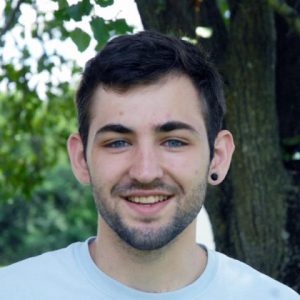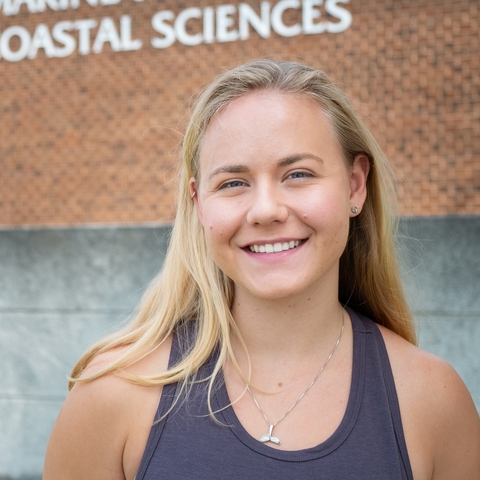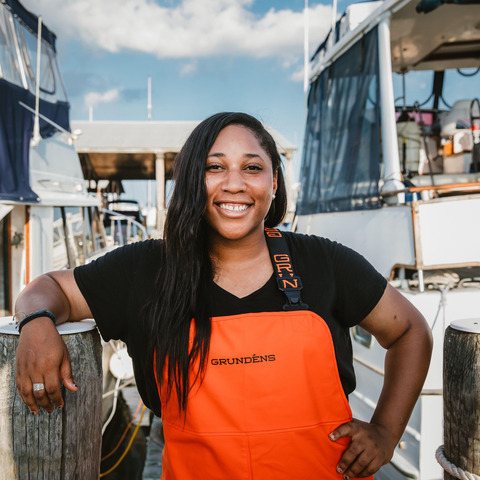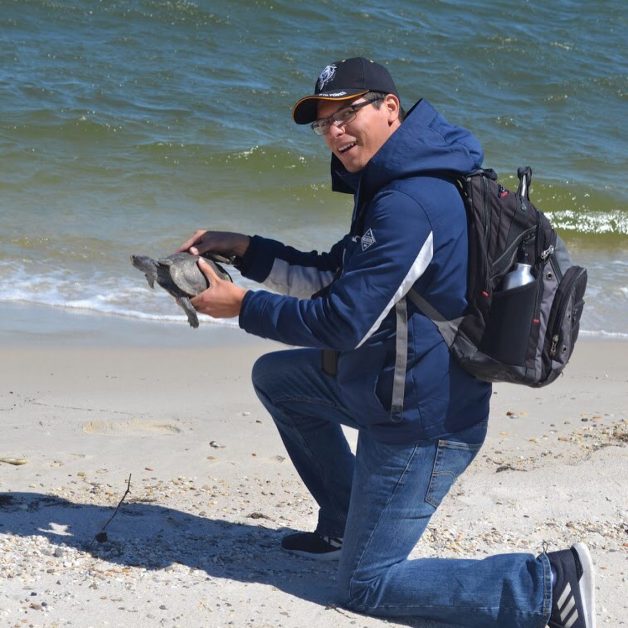Brendan Campbell
 After graduating from Rutgers University with a B.Sc. in Biological Oceanography, I started working at shellfish farms along the coast of New Jersey with plans of starting my own oyster farm. While working at different farms, I noticed that I was asking more questions than I was finding answers. These questions inspired me to go back to school to research topics regarding shellfish aquaculture production. Lately, I have been developing and applying tools for use in shellfish aquaculture that can inform growers on how to best manage crops depending on personal market preference.
After graduating from Rutgers University with a B.Sc. in Biological Oceanography, I started working at shellfish farms along the coast of New Jersey with plans of starting my own oyster farm. While working at different farms, I noticed that I was asking more questions than I was finding answers. These questions inspired me to go back to school to research topics regarding shellfish aquaculture production. Lately, I have been developing and applying tools for use in shellfish aquaculture that can inform growers on how to best manage crops depending on personal market preference.
Laura Wiltsee
 I have always been interested in how aquatic ecosystems function, which led me to study marine science and ecology at Rutgers University. As an undergraduate at Rutgers, I worked mostly with underwater gliders using data collected to determine impacts of pH changes on shellfish and finfish species. I also pursued projects that worked more hands-on with organisms, sparking my interest in aquaculture. While deciding what I would like to study in graduate school, I found a strong pull to oysters and how to better understand the ecological impacts of these organisms in a changing aquatic environment.
I have always been interested in how aquatic ecosystems function, which led me to study marine science and ecology at Rutgers University. As an undergraduate at Rutgers, I worked mostly with underwater gliders using data collected to determine impacts of pH changes on shellfish and finfish species. I also pursued projects that worked more hands-on with organisms, sparking my interest in aquaculture. While deciding what I would like to study in graduate school, I found a strong pull to oysters and how to better understand the ecological impacts of these organisms in a changing aquatic environment.
My project uses fluorometry, oximetry, and a multipart flow-through system to determine long-term changes in feeding and respiration of oysters under natural fluctuations in water quality. This project takes into account the algal community that serves as a food source to oysters and the water parameters that oysters would see in a natural environment, such as temperature, salinity, and turbidity. The results of this study will produce a high-resolution view at feeding and respiration variation over time. This will better inform models of both wild and aquaculture oysters’ filtration rates, leading to more realistic expectations of oysters’ impact on ecosystems. Both farmers and ecosystem managers will be able to use this information to track growth and impact of their oysters in changing water quality.
Twitter: @soggy_biologist; Researchgate Profile: https://www.researchgate.net/profile/Laura-Wiltsee-2
Imani Black
 Having family roots on the Eastern Shore of Maryland, I’ve always wanted to have a career in restoration and conservation of the Bay. After graduating from Old Dominion University with a Marine Biology degree, I started the Oyster Aquaculture Training (OAT) program at Virginia Institute of Marine Science getting my first introduction into the shellfish aquaculture industry. Following the OAT program I started my career in aquaculture working on oyster hatcheries and farms on the Eastern shores of VA and MD. In 2018, I became the Assistant Hatchery Manager for the first privately owned hatchery in Maryland assisting with larvae production, nursery husbandry and farm grow out. Due to the sustainability of aquaculture and
Having family roots on the Eastern Shore of Maryland, I’ve always wanted to have a career in restoration and conservation of the Bay. After graduating from Old Dominion University with a Marine Biology degree, I started the Oyster Aquaculture Training (OAT) program at Virginia Institute of Marine Science getting my first introduction into the shellfish aquaculture industry. Following the OAT program I started my career in aquaculture working on oyster hatcheries and farms on the Eastern shores of VA and MD. In 2018, I became the Assistant Hatchery Manager for the first privately owned hatchery in Maryland assisting with larvae production, nursery husbandry and farm grow out. Due to the sustainability of aquaculture and
my love for my career, in 2020 I became the founder and president of a nonprofit organization, Minorities In Aquaculture (MIA). MIA encourages women of color to explore the aquaculture
industry in all disciplines by providing hands-on aquaculture programs, internships and mentorship opportunities while cultivating an empowering and supportive network for all women.
After 5 years in the commercial aquaculture industry, I decided to pursue graduate school to explore the aquaculture industry within academia. Since January, I’ve been a Faculty
Research Assistant for the Gray lab assisting with SAIL research and internship programs while taking graduate courses. In the Fall of 2021, I will be a full time MEES student exploring ways to
combine the efforts of Minorities In Aquaculture and aquaculture research.
Alan Williams
 As a Mechanical Engineering Undergrad at the University of Arizona, I often questioned myself on what future was possible with the knowledge and skills I was developing. Would I be driven into defense technology development? Or perhaps I would lean more towards automotive design? I did not gain focus on my career until I joined the Marine Awareness and Conservation Society on Campus, which established my passion for the research and care of marine life around the world. Shortly after, I decided to pick up a minor in Marine Science, with a focus on oceanography and aquaculture. During this time, I was able to take my first steps in my marine science career by taking part in the Maryland Sea Grant REU during the summer of 2019, where I assisted Drs Dong Liang and Chris Rowe on their diamondback terrapin research project. I worked both on the field and by developing an algorithm to predict terrapin nest temperatures for future summers. I also presented this research via poster during the Ocean Sciences 2020 conference. After obtaining my B. S. in ME from the U of A, I now find myself as part of the MEES program working with Dr. Matt Gray and crew to further improve the quality, efficiency, and sustainability of oyster aquaculture in the Chesapeake Bay.
As a Mechanical Engineering Undergrad at the University of Arizona, I often questioned myself on what future was possible with the knowledge and skills I was developing. Would I be driven into defense technology development? Or perhaps I would lean more towards automotive design? I did not gain focus on my career until I joined the Marine Awareness and Conservation Society on Campus, which established my passion for the research and care of marine life around the world. Shortly after, I decided to pick up a minor in Marine Science, with a focus on oceanography and aquaculture. During this time, I was able to take my first steps in my marine science career by taking part in the Maryland Sea Grant REU during the summer of 2019, where I assisted Drs Dong Liang and Chris Rowe on their diamondback terrapin research project. I worked both on the field and by developing an algorithm to predict terrapin nest temperatures for future summers. I also presented this research via poster during the Ocean Sciences 2020 conference. After obtaining my B. S. in ME from the U of A, I now find myself as part of the MEES program working with Dr. Matt Gray and crew to further improve the quality, efficiency, and sustainability of oyster aquaculture in the Chesapeake Bay.